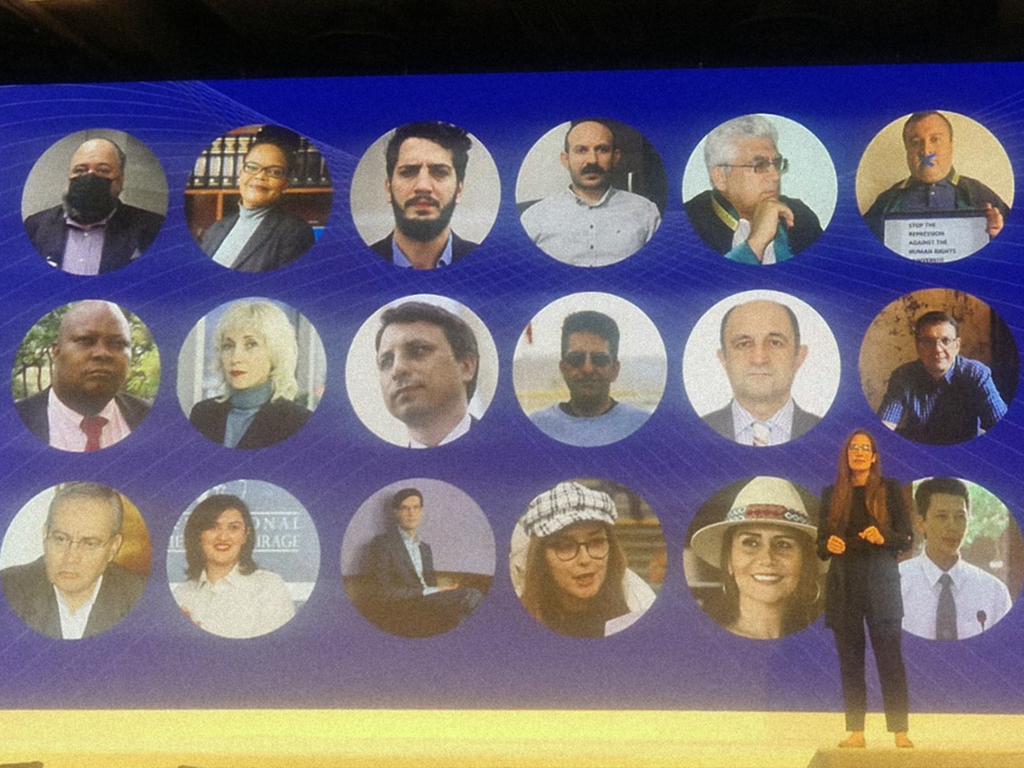Lawyers defending human rights defenders are facing growing threats, yet their struggles remain invisible. As they stand on the frontlines of justice, they’re increasingly vulnerable to the same attacks aimed at silencing the journalists and activists they protect.
A new program hosted by the Thomson Reuters Foundation in partnership with Media Defence and the American Bar Association, aims to improve legal security in the field of journalism, whilst creating a global network of law firms and civil society groups, to counter the targeting of human rights defenders and lawyers in the field.

Last week, at the Trust Conference, hosted by the Thomson Reuters Foundation, Andra Matei, Director of Avant-Garde Lawyers (AGL), attended a powerful session titled “Defending the Defenders: Upholding Justice in the Face of Lawfare” on the rising threats faced by legal professionals defending journalists and other human rights defenders globally.
At the heart of the session was a sobering truth: the weaponization of the law, or “lawfare,” has escalated in intensity and complexity. Lawyers who dare to stand up for the principles of free speech and independent media often find themselves in the crosshairs, facing harassment, persecution, hacking and illegal seizure of personal property and casefiles, and even physical threats. We know that this is not a hypothetical risk. The Avant-Garde Lawyers team is vulnerable to these attacks, and our work is carried out in full knowledge of the danger. In the early years of AGL, our Director Andra Matei’s phone was hacked—an alarming indicator of the very real dangers faced by lawyers working to defend human rights across borders.
The discussion highlighted an unsettling and growing trend in which lawyers defending journalists, artists, and human rights activists are increasingly targeted by powerful actors seeking to silence critical voices. These lawyers are taking significant risks—risks that have largely gone unseen by the broader public. Despite being a recourse for vulnerable individuals seeking legal–and sometimes emergency–support, their own vulnerability remains overlooked.
This growing phenomenon, described by the speakers as “transnational targeting,” is part of a larger, more insidious strategy by authoritarian regimes and other malign actors to silence dissent. From phone hacking to illegal police raids and seizures, these attacks, often taking place in supposedly safe jurisdictions like Europe and the United States, underscore the global nature of this threat.
One important acknowledgment during the session was that the targeting of lawyers for their work defending journalists is a relatively new and still largely undocumented issue. There is a lack of data, and currently very few frameworks designed to protect lawyers working on human rights cases, and bar associations around the world are only just beginning to wake up to the magnitude of the problem. This absence of formal protections leaves these legal professionals in a precarious position, facing risks without the institutional safety nets that might otherwise be available.
This lack of institutional support leaves lawyers particularly vulnerable. In some cases, they are being targeted alongside their clients, with the added burden of being isolated from any formal protection mechanisms. In a chilling example shared during the session, a case was recounted in which over 20 journalists were arrested, followed by the arrest of 60 lawyers connected to them. This type of large-scale targeting of lawyers is alarming, yet it has largely flown under the radar—until now.
The new programme aims to set a precedent of greater protections for journalists via the following methods: 1. Supporting independent media journalists and providing greater protection from threats to media freedom. 2. Providing easy and unfettered access to the law, which for many journalists can be prohibitively expensive and complicated. And 3. Encouraging responsible and sustainable business practices such as data sharing and transparency. This project sets a vital precedent not only for journalists and the lawyers who defend them, but for organisations like our own, where our team are everyday defending artists in the firing line of transnational harassment, persecution. The danger is present to legal teams, creatives, human rights defenders, and journalists alike, and this new project is a vital first step in ensuring greater protection.
The session concluded with a call to action: the world must wake up to the reality that lawyers are now among those being targeted in the fight to defend democratic values. As “lawfare” continues to evolve, the risks faced by these legal professionals will only increase. It is therefore imperative that governments, bar associations, and civil society organizations work together to develop the protections and frameworks needed to safeguard the lawyers who are, in many cases, the last line of defense for journalists and human rights defenders.
Learn more about the initial findings of this programme here.
The session “Defending the Defenders: Upholding Justice in the Face of Lawfare” featured prominent human rights defenders, including Jose Zamora (Chief Communications Officer, EXILE), Caoilfhionn Gallagher KC (Barrister, Doughty Street Chambers), Rebecca Vincent (Director of Campaigns, Reporters Without Borders), and Ginna Anderson (Associate Director, Center for Human Rights at the American Bar Association). It was introduced by Carlina Henriquez-Schmitz, Director of TrustLaw.
